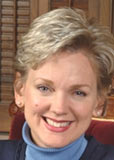
Voting for Change
Barack Obama won a solid victory, and the congressional oversight and appropriations committees that matter for OSH professionals will be shaken up in January.
- By Jerry Laws
- Nov 05, 2008
 The Nov. 4 election gave voters a golden opportunity to revolutionize Washington's safety pantheon. Not only were seven of the 21 members of the U.S. Senate Health, Education, Labor, and Pensions (HELP) Committee either seeking re-election, the presidency, or retiring and leaving their seats open, but also eight of the 15 members of the Senate Appropriations Subcommittee on Labor, HHS, Education, and Related Agencies were running or leaving office -- and one of them, Republican Sen. Ted Stevens, 85, of Alaska, was convicted eight days before the election of seven federal felony charges of lying on his financial disclosure forms to hide $250,000 in gifts and home renovations. Alaska voters appear to have barely denied him a seventh term, based on absentee and early votes counted Nov. 18.
The Nov. 4 election gave voters a golden opportunity to revolutionize Washington's safety pantheon. Not only were seven of the 21 members of the U.S. Senate Health, Education, Labor, and Pensions (HELP) Committee either seeking re-election, the presidency, or retiring and leaving their seats open, but also eight of the 15 members of the Senate Appropriations Subcommittee on Labor, HHS, Education, and Related Agencies were running or leaving office -- and one of them, Republican Sen. Ted Stevens, 85, of Alaska, was convicted eight days before the election of seven federal felony charges of lying on his financial disclosure forms to hide $250,000 in gifts and home renovations. Alaska voters appear to have barely denied him a seventh term, based on absentee and early votes counted Nov. 18.
Among the 18 members of the equivalent House Appropriations subcommittee, three retired and a fourth won a U.S. Senate seat.
Topping it all, electing the new president would decide which party chooses the next Labor Secretary and the leaders of OSHA, MSHA, NIOSH, CDC, EPA, FEMA, DHS, and more.
The outcome strengthens Democratic control and is likely to bring about a sharp reversal of the Bush administration's hands-off posture on safety and health regulations and enforcement.
Appropriations Panels
When the 111th Congress begins work at noon Jan. 6, 2009, it's certain that the House Appropriations subcommittee with responsibility for OSHA, MSHA, and Labor Department funding will be significantly changed because three of its seven Republican members, including Ranking Member James Walsh of New York, chose to retire this year. One of the 11 Democratic members, Tom Udall of New Mexico, won a U.S. Senate seat on Nov. 4.
The Senate Appropriations subcommittee had five Democratic members re-elected, including the subcommittee's chairman, Tom Harkin of Iowa. Republican member Larry Craig of Idaho did not seek re-election, and Stevens lost. Because Democrats expanded their razor-thin majority in the Senate by seven seats and added to their majority in the House, their control over funding decisions, the bills considered and marked up, and hearings held by these and other committees and subcommittees will increase in the 111th Congress.
While the Democrats are closer to the magical 60-member, filibuster-proof Senate number they hoped for from this election, they are about to gain power with two of their aging lions hobbled. Sen. Robert Byrd of West Virginia, who will celebrate his 91st birthday Nov. 20, announced Nov. 7 that he is giving up the chairmanship of the Appropriations Committee to Sen. Daniel Inouye of Hawaii. The other hobbled Democrat is Sen. Ted Kennedy, 76, of Massachusetts, who chairs the HELP Committee and just returned to Capitol Hill; he was diagnosed with brain cancer in May.
Oversight Committees
Three Republicans on the Senate HELP Committee won re-election in a strongly Democratic election year. A fourth, Wayne Allard of Colorado, retired and left his seat open.
Both HELP Democrats seeking re-election were easy winners: Harkin of Iowa and Jack Reed of Rhode Island. And so was Barack Obama of Illinois, currently ninth in seniority among HELP Democrats but now the U.S. president-elect.
The HELP Subcommittee on Employment and Workplace Safety loses Obama and Allard, but the other 13 members are intact.
On the House side, two of the 48 members of the U.S. House Committee on Education and Labor, Democrat Carol Shea-Porter of New Hampshire and Republican Ric Keller of Florida, were in tight re-election races rated as "no clear favorite" by Congressional Quarterly (www.cq.com) two weeks before the election. Shea-Porter won hers, but Keller, who has served four terms in the House, lost. Two other Republicans on the committee were defeated: John "Randy" Kuhl Jr., R-N.Y., and Timothy Walberg, R-Mich.
Education and Labor's chairman, Californian George Miller, has been among OSHA's and MSHA's toughest critics. His was the first committee to act on the Genetic Information Nondiscrimination Act of 2007 (GINA), which was signed into law in May 2008, and on H.R. 4926, the Josh Miller HEARTS Act, which would establish a grant program for automated external defibrillators in U.S. elementary and secondary schools.
H.R. 4926 passed the House of Representatives but stalled in the Senate HELP Committee. Also stalling there were H.R. 5522, Miller's bill for force OSHA to issue a combustible dust standard, and H.R. 2768, his bill that would have toughened the MINER Act.
The smallest Education and Labor subcommittee, the Subcommittee on Workforce Protections, has held several hearings on OSHA's enforcement and standards posture in the past two years.
 |
Michigan Governor
Jennifer Granholm |
U.S. Labor Secretary
His chief of staff and picks for Treasury and State secretaries are expected to be the first personnel announcements from President-Elect Obama, and he might well announce them well before he is sworn in Jan. 20.
His nominations for Labor secretary and the new chiefs of MSHA and OSHA may take much longer, but the big labor unions that went all-out to help his campaign are eager for a new direction from all three offices, so he might move quickly.
In October, CQ Politics' election 2008 feature Cabinet Maker identified three potential Labor secretaries for John McCain to consider and three other candidates for Obama. CQ staffer Rebecca Adams said U.S. Chamber of Commerce Vice President Randel K. Johnson, National Association of Manufacturers President John Engler, and Heritage Foundation Senior Fellow Jim Talent (a former U.S. senator from Missouri) were candidates who would have suited McCain, while suitable candidates for Obama are retired AFL-CIO Executive Vice President Linda Chavez-Thompson, former House Democratic leader Richard Gephardt (now a senior counsel in the Washington, D.C., office of law firm DLA Piper), and Michigan Gov. Jennifer Granholm, Adams wrote.
Since 1987, the only male Labor secretary was Robert Reich, who served under President Bill Clinton. Adams said Chavez-Thompson is a "logical choice" if Obama wants a veteran leader from organized labor, although Gephardt received strong union support throughout his political career.
Granholm could get the nod because she was an early supporter of Obama, she knows the embattled auto industry well, and she is barred by Michigan law from seeking a third term in 2010.
This article originally appeared in the November 2008 issue of Occupational Health & Safety.